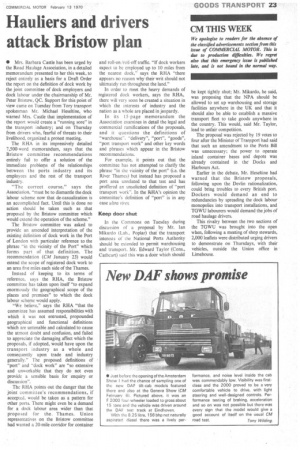Hauliers and drivers attack Bristow plan
Page 25

If you've noticed an error in this article please click here to report it so we can fix it.
• Mrs. Barbara Castle has been urged by the Road Haulage Association, in a detailed memorandum presented to her this week, to reject entirely as a basis for a Draft Order the report on the definition of dock work by the joint committee of dock employers and dock labour under the chairmanship of Mr. Peter Bristow, QC. Support for this point of view came on Tuesday from Tory transport spokesman Mr. Michael Heseltine, who warned Mrs. Castle that implementation of the report would create a "running sore" in the transport industry; and on Thursday from drivers who, fearful of threats to their livelihood, organized a protest meeting.
The RHA in its impressively detailed 7,500-word memorandum, says that the Bristow committee recommendations entirely fail to offer a solution of the immediate problems of the relationships between the ports industry and its employees and the rest of the transport industry.
"The correct course," says the Association. "must be to dismantle the dock labour scheme now that de-easualization is an accomplished fact. Until this is done no action should be taken such as that proposed by the Bristow committee which would extend the operation of the scheme."
The Bristow committee was asked to provide an amended interpretation of the existing definition of dock work in the Port of London with particular reference to the phrase -in the vicinity of the Port" which forms part of that definition. The recommendation (CM January 23) would extend the scope of registered dock work to an area five miles each side of the Thames.
Instead of keeping to its terms of reference, says the RHA, the Bristow committee has taken upon itself "to expand enormously the geographical scope of the places and premises" to which the dock labour scheme would apply.
"We believe," says the RHA "that the committee has assumed responsibilities with which it was not entrusted, propounded geographical and functional definitions which are untenable and calculated to cause the utmost doubt and confusion, and failed to appreciate the damaging affect which the proposals, if adopted, would have upon the transport industry as a whole and consequently upon trade and industry generally." The proposed definitions of "port" and -dock work" are "so extensive and unworkable that they do not even provide a sensible basis. for enquiry or discussion".
The RHA points out the danger that the joint committee's recommendations,. if accepted, would be taken as a pattern for other ports. There might even be a demand for a dock labour area wider than that proposed for the, Thames. Union representatives on the Bristow committee had wanted a 20-mile corridor for container and roll-on/roll-off traffic. "If dock workers expect to be employed up to 10 miles from the nearest dock," says the RHA "there appears no reason why their writ should not ultimately run throughout the land."
• In order to meet the heavy demands of registered dock workers, says the RHA, there will very soon be created a situation in which the interests of industry and the nation as a whole are placed in jeopardy.
In its 15-page memorandum the Association examines in detail the legal and commercial ramifications of the proposals, and it questions the definitions of "warehouse". "delivery", "port", "goods", "port transport work" and other key words and phrases which appear in the Bristow recommendations.
For example, it points out that the committee has not attempted to clarify the phrase "in the vicinity of the port" (i.e. the River Thames) but instead has proposed a port area unrelated to that test and has proffered an unsolicited definition of "port transport work". In the RiHA's opinion the committee's definition of "port" is in any case ultra rires.
Keep door shut In the Commons on Tuesday during discussion of a proposal by Mr. Ian Mikardo (Lab., Poplar) that the transport interests of the National Ports Authority should be extended to permit warehousing and transport, Mr. Edward Taylor (Cons., Cathcart) said this was a doOr which should be kept tightly shut; Mr. Mikardo, he said, was proposing that the NPA should be allowed to set up warehousing and storage facilities anywhere in the UK and that it should also be able to establish a massive transport fleet to take goods anywhere in the country. This would, said Mr. Taylor, lead to unfair competition.
The proposal was rejected by 19 votes to four after the Minister of Transport-had said that such an amendment to the Ports Bill was unnecessary; the power to operate inland container bases and depots was already contained in the Docks and Harbours Act.
Earlier in the debate, Mr. Heseltine had warned that the Bristow proposals, following upon the Devlin rationalization, could bring troubles to every British port. Dockers would demand an end to redundancies by spreading the dock labour monopolies into transport installations, and TGWU labourers would demand the jobs of road haulage drivers.
This rivalry between the two sections of the TGWU was brought into the open when, following a meeting of shop stewards, 2,000 leaflets were distributed urging drivers to demonstrate on Thursdays, with their vehicles, outside the Union office in Limehouse.




































































